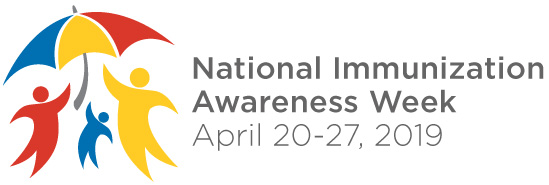
This is National Immunization Awareness week. Immunize Canada (immunize.ca) organizes this event every year to raise awareness about immunization in Canada. The FNHA Immunize Team is posting a series of immunization facts, stories and resources. In this one, learn the answers to common questions about immunization.
1. I had a severe reaction after an immunization when I was a child. Should I be worried about my child having a similar reaction when she receives her immunizations? Should my child avoid that particular vaccine?
Routine vaccines are very safe for children with healthy immune systems. Understandably parents are concerned about possible side effects from vaccines. However, reactions to vaccines are not hereditary and most side effects from vaccines are minor, if they occur at all. The area where the shot was given may be sore. And some children may be fussy or get a slight fever. Serious side effects are very rare. It's much more dangerous to risk getting the diseases than to risk having a serious reaction to the vaccines.
Vaccines must go through years of research, followed by testing and retesting before they can be used in Canada. Several systems are in place to monitor the creation, the use, and the safety of vaccines. Each vaccine must be proven to be safe and to work before it can be given. If these systems flag that a vaccine is frequently associated with even minor adverse reactions, an alternate vaccine will be used. An example of this is highlighted with the pertussis vaccine.
| PERTUSSIS VACCINE Pertussis is a serious disease that can cause complications such as pneumonia, seizures, brain damage or even death. These complications happen most often in infants under 1 year of age. Each year in Canada, 1 to 3 deaths occur due to pertussis, mostly in babies less than 3 months of age who have not been immunized. For some time, the only vaccine available to protect against pertussis was the whole-cell pertussis vaccine. This vaccine was very effective and protected many people against this deadly disease. However, immunization with whole-cell Pertussis vaccines was frequently associated with minor adverse reactions such as redness and swelling at the site of injection, along with fever and agitation. Local reactions tended to increase with age and the number of injections. Because of this, whole-cell Pertussis vaccines were no longer recommended for immunization. To address the adverse reactions observed with the whole-cell vaccines, acellular Pertussis vaccines were developed. Now all babies in BC are offered the acellular pertussis vaccine for protection against whooping cough |
2. Should I consider an “alternative schedule” when immunizing my child? Won’t that many shots at once overwhelm their immune system?
The schedule recommended by experts is designed to work best with a child's immune system at certain ages and at certain times. The schedule is set up so that your child gets the best protection possible at the earliest age possible from the fewest shots possible. Experts review the schedules based on the best research available and change the schedules as needed. A different schedule may not provide protection for your child. If shots are spread out or skipped, a child may get the disease during the delay. Some vaccines are given together to protect against several diseases at once. Your child's immune system is amazing! It can easily handle more than one vaccine at a time safely and effectively.
| DID you know? Babies have the capacity to produce up to one billion antibodies. As such, it is estimated that (theoretically) an average baby could handle up to 10,000 vaccines at one time without concern. |
3. Question: If herd immunity works, why do I need to get immunized? Doesn't herd immunity protect me, or my child?
For many diseases, children are at the highest risk of the disease and also have the most severe illness. The best way to protect someone against a disease is to vaccinate them directly, rather than rely on 'indirect' protection through herd immunity. If someone who is unvaccinated does meet the germ responsible for that disease they will be completely at risk of getting the disease.
Herd immunity only works for diseases that are spread directly between people (i.e. are 'contagious'), like measles. One example where it would not work is tetanus. The bacteria which cause tetanus lives in the soil, so anyone who is not vaccinated would be at risk and could easily be infected if they were exposed to bacteria in the soil, such as through a dirty wound, even if everyone else around them was vaccinated and protected.
Resources

